

The Ash Tree In Indo European Culture. Prati di asfodelo. Da Wikipedia, l'enciclopedia libera.
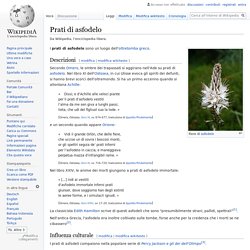
Descrizioni[modifica | modifica wikitesto] Secondo Omero, le ombre dei trapassati si aggirano nell'Ade su prati di asfodelo. Death Tropes. Undead Index. Revista de Folklore. Si desea contactar con la Revista de Foklore puede hacerlo desde la sección de contacto de la Fundación Joaquín Díaz > * Es válido cualquier término del nombre/apellido del autor, del título del artículo y del número de revista o año.
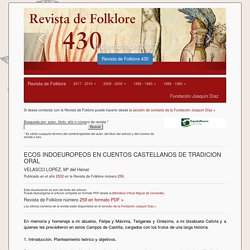
VELASCO LOPEZ, Mª del Henar Publicado en el año 2002 en la Revista de Folklore número 259. Esta visualización es solo del texto del artículo. Puede descargarse el artículo completo en formato PDF desde la Biblioteca Virtual Miguel de Cervantes. Asphodel Meadows: The People’s Paradise — Part II: My Paradise Found. Audio Player What wond’rous life in this I lead!
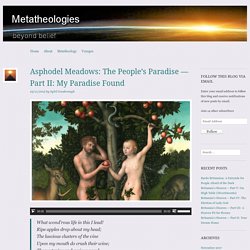
Ripe apples drop about my head;The luscious clusters of the vineUpon my mouth do crush their wine;The nectarine and curious peachInto my hands themselves do reach;Stumbling on melons as I pass,Ensnar’d with flow’rs, I fall on grass. (Andrew Marvell, The Garden) I find myself walking though a cool green tunnel of foliage. As I emerge into the bright morning I see a lake sparkling ahead of me in the middle distance. Meanwhile the mind, from pleasure less,Withdraws into its happiness …Annihilating all that’s madeTo a green thought in a green shade. My eyes follow the spring, which issues into a stream flowing down across an expanse of emerald grass. My gaze now moves out to the lake and I see in the middle a small island crowned by a white marble temple. Orpheus in a Wood by Henri Martin See there the olive-grove of Academe, Plato’s retirement, where the Attic bird Trills her thick-warbled notes the summer long. Asphodel Meadows: The People’s Paradise — Part I: Lilies of the Field.
Audio Player Death is one of two things.
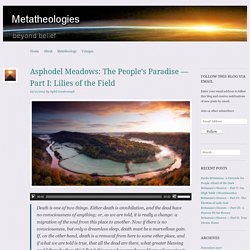
Either death is annihilation, and the dead have no consciousness of anything; or, as we are told, it is really a change: a migration of the soul from this place to another. Now if there is no consciousness, but only a dreamless sleep, death must be a marvellous gain. If, on the other hand, death is a removal from here to some other place, and if what we are told is true, that all the dead are there, what greater blessing could there be than this?
Put it this way: how much would one of you give to converse with Orpheus and Homer? As the boat glides gently down the river I sink once more into a light trance in which time seems to be suspended. Suddenly I am aware that the boat has stopped and is moored to the riverbank. Asphodel Meadows: The People’s Paradise — Part III: Et in Arcadia. Orpheus and Eurydice © Total Immersion Ltd 2012 Audio Player Fair youth, beneath the trees, thou canst not leaveThy song, nor ever can those trees be bare;Bold Lover, never, never canst thou kiss,Though winning near the goal yet, do not grieve;She cannot fade, though thou hast not thy bliss,For ever wilt thou love, and she be fair!
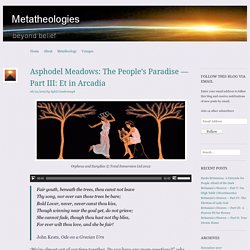
John Keats, Ode on a Grecian Urn “We’re almost out of our time together. Do you have any more questions?” “Not for the moment, thank you, you’ve given me such a wealth of information to reflect on and absorb. “Alas not I, only my instrument,” he raises an ironic eyebrow. “Your wife?” “My beloved wife Eurydice is Queen Persephone’s favourite lady-in-waiting.
Isis © Total Immersion Ltd 2012 Isis nursing her son Horus “Isis?!” “What? “Now pay attention. “There’s a lot more I could tell you about Isis, but for now just be mindful not to take her name in vain by associating her in any way with mindless violence and barbarism. “Thank you for enlightening me.” Asphodel Meadows: The People’s Paradise — Part IV: Orpheus in the Underworld. Audio Player The One remains, the many change and pass; Heaven’s light forever shines, Earth’s shadows fly; Life, like a dome of many-colour’d glass, Stains the white radiance of Eternity.
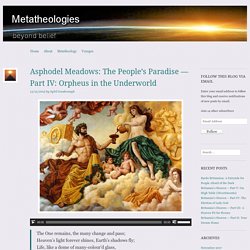
(Adonais: An Elegy on the Death of John Keats by Percy Bysshe Shelley) Ceres y dos ninfas. Bibliografía +
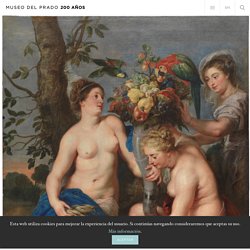
LOCUS AMOENUS. Locus Amoenus es un tópico literario clásico que significa “lugar ameno o bonito”.
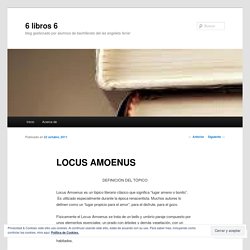
Es utilizado especialmente durante la época renacentista. Muchos autores lo definen como un “lugar propicio para el amor”, para el disfrute, para el gozo. El prado, ultramundo indoeuropeo. VELASCO LOPEZ, Mª del Henar Revista número:259 Año:2002 Páginas en la revista: 18-36 En memoria y homenaje a mi abuelos, Felipe y Máxima, Teógenes y Onésima, a mi bisabuela Calixta y a quienes les precedieron en estos Campos de Castilla, cargados con los frutos de una larga historia. 1.
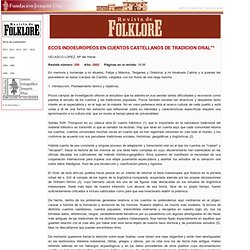
Introducción. Planteamiento teórico y objetivos. Pocos campos de investigación ofrecen al estudioso que se adentra en sus sendas tantas dificultades y recovecos como plantea el estudio de los cuentos y las tradiciones populares. Señala Stith Thompson en su clásica obra El cuento folklórico (1) que lo importante en la naturaleza tradicional del material folklórico es transmitir lo que el narrador ha recibido. Habida cuenta de ese constante y singular proceso de adaptación y transmisión oral en el que los cuentos se "copian" y "recopian", trazar la historia de los mismos es una tarea harto compleja en cuyo discernimiento han sobresalido en las últimas décadas los cultivadores del método histórico-geográfico.